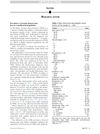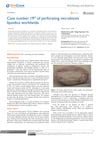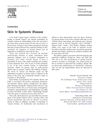April 2020 in “BMC endocrine disorders” A woman with childhood growth hormone deficiency had multiple hormone deficiencies and developed serious lung and kidney problems later in life.
 November 2022 in “Orphanet Journal of Rare Diseases”
November 2022 in “Orphanet Journal of Rare Diseases” Long-term use of androgens can help manage Hereditary Angioedema (HAE) but may cause serious side effects, so alternative treatments with fewer side effects are being considered.
 2 citations,
April 2021 in “Journal of The American Academy of Dermatology”
2 citations,
April 2021 in “Journal of The American Academy of Dermatology” Female pattern hair loss affects 32.3% of women, increasing with age and showing no racial differences.
 February 2018 in “InTech eBooks”
February 2018 in “InTech eBooks” Diagnosing and treating PCOS is complex due to differing criteria and requires a team approach.
 February 2012 in “InTech eBooks”
February 2012 in “InTech eBooks” PCOS increases the risk of heart disease and type 2 diabetes in women.
 13 citations,
January 2012 in “International Journal of Trichology”
13 citations,
January 2012 in “International Journal of Trichology” Most hirsutism patients had idiopathic hirsutism or PCOS, with hormonal imbalances and signs like acne and irregular periods.

There are many ways to treat Polycystic Ovary Syndrome, including lifestyle changes, surgery, and various medications, but more research is needed for better treatments.
 36 citations,
October 2016 in “Bone”
36 citations,
October 2016 in “Bone” A male with aromatase deficiency improved bone health with estradiol treatment.
January 2023 in “Frontiers in Medicine”  2 citations,
January 2018
2 citations,
January 2018 The document reports the 19th global case of a rare skin condition in a patient from Colombia.
 4 citations,
May 2008 in “Clinics in Dermatology”
4 citations,
May 2008 in “Clinics in Dermatology” Skin problems can indicate different diseases inside the body.
November 2018 in “Journal of dermatology & cosmetology” The document reports the first case of a rare skin condition in Colombia, the 19th case worldwide.
 June 2023 in “Journal of Ayurvedic and herbal medicine”
June 2023 in “Journal of Ayurvedic and herbal medicine” Pumpkin seeds may improve health due to their rich nutrients and potential to treat various conditions.
 June 2022 in “International journal of drug delivery technology”
June 2022 in “International journal of drug delivery technology” Convolvulus arvensis ethanolic extract can potentially promote hair growth and reduce hair loss.
 4 citations,
February 2022 in “Nutrients”
4 citations,
February 2022 in “Nutrients” Korean Red Ginseng saponins may protect skin from inflammation and darkening caused by air pollution.
 3 citations,
February 2018 in “InTech eBooks”
3 citations,
February 2018 in “InTech eBooks” Traditional Chinese Medicine and acupuncture may improve Polycystic Ovarian Syndrome symptoms and reduce costs, but more research is needed.
 5 citations,
October 2018 in “Medical Science Monitor”
5 citations,
October 2018 in “Medical Science Monitor” Women with PCOS have lower amylin levels, which are not related to their body weight.
3 citations,
January 2022 in “Anais Brasileiros De Dermatologia” Androgenetic alopecia in teens is linked to obesity and other metabolic risks, needing early diagnosis and management.
 1 citations,
October 2023 in “BMC oral health”
1 citations,
October 2023 in “BMC oral health” Two patients treated with TAC for mouth fibrosis improved but developed Cushing's Syndrome symptoms.
 42 citations,
July 2017 in “Scientific Reports”
42 citations,
July 2017 in “Scientific Reports” Women with PCOS are more likely to have insulin resistance and obesity, especially those with the most severe type I PCOS.
 4 citations,
June 2019 in “Revista brasileira de ginecologia e obstetrícia”
4 citations,
June 2019 in “Revista brasileira de ginecologia e obstetrícia” Using only hyperandrogenism to diagnose PCOS can lead to overdiagnosis.
16 citations,
January 2014 in “Obesity surgery” Vertical sleeve gastrectomy improved metabolism, behavior, and reproduction in obese rats with PCOS.
 1 citations,
May 2023 in “Journal of the American Academy of Dermatology”
1 citations,
May 2023 in “Journal of the American Academy of Dermatology” Younger patients and those with more hair loss are less likely to benefit from oral steroid treatment for hair loss, and low vitamin D may predict relapse.

Newer retinoid drugs are effective for skin conditions but have significant side effects.
 March 2020 in “International journal of contemporary medical research”
March 2020 in “International journal of contemporary medical research” Patients with metabolic syndrome often have skin problems like acanthosis nigricans and skin tags, and early treatment is important to prevent serious issues.
 21 citations,
September 2017 in “Journal of Obstetrics and Gynaecology Research”
21 citations,
September 2017 in “Journal of Obstetrics and Gynaecology Research” Chromium supplements don't improve insulin, hormone levels, or cholesterol in women with PCOS but raise testosterone levels.
 1 citations,
July 2017 in “Clinical research in dermatology”
1 citations,
July 2017 in “Clinical research in dermatology” Hair loss, known as Androgenetic Alopecia, is often caused by hormones and can be diagnosed using noninvasive techniques. Treatments include topical minoxidil and oral finasteride, with new treatments being explored. There may also be a link between this type of hair loss and heart disease risk.
 32 citations,
April 2014 in “American Journal of Clinical Dermatology”
32 citations,
April 2014 in “American Journal of Clinical Dermatology” People with psoriasis are more likely to have Metabolic Syndrome than those without psoriasis.
 February 2022 in “Mediators of Inflammation”
February 2022 in “Mediators of Inflammation” Women with Polycystic Ovary Syndrome (PCOS) have lower levels of a substance called DIAPH1 in their blood, which is linked to changes in sugar metabolism and insulin resistance.
July 2024 in “Behavioural Brain Research” Long-term finasteride treatment reduces depression and brain issues in obese male rats.























